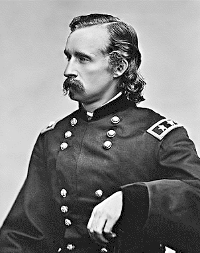On This Date In History
George Armstrong Custer
It has a been over a century since the death of George Custer at the Battle of the Little Bighorn. Yet interest in the man remains. Some historians claim that aside from Lincoln, there is no other personality of the Civil-war era that holds as much interest today as Custer does. Still, one has to wonder why Custer remains in the public conscious when so many others are forgotten. Further, the fact that he is most often portrayed as an Indian-hating genocidal maniac begs the question: if he's is such a bad man, why the interest? Is it similar to a train wreck that people can't help but watch? Or is there something more to him than the Hitleresque man we as Americans have come to accept? This article is a brief summary of the man, and perhaps may serve to answer some of these questions.
Birth, Youth, And West Point
George Custer was born in New Rumley, Ohio on December 5th, 1839. His was a large but close family, and he was thrilled to watch the local militia (of which is father was a part) on the parade ground. There is a story that his mother made him a small military uniform and he would view the troops with a wooden sword. It is further related that it was during this activity that he was happiest in these days of early life.
George would gain a reputation as a prankster and joker in school. That is until he would serve as a school master. In a letter George would tell of how he left home at the early age of 16 and yet did not fall into the wrong company. Within a few years of beginning his teaching career, George sought and obtained admittance in the the United States Military Academy (better known as "West Point").
There, he would be known as a mischief maker, whose primary concern wasn't having a clean record. George's demerit record at West Point has been made available, noting such offenses as failing to salute a senior officer and his uniform not being properly arranged. Still, he was able to make the grades needed for graduation.
Just before graduation however, George obtained a demerit that threatened his graduation. His offense was that he did not stop a fight between two cadets during his watch. George would graduate - with the American Civil War already threatening.
To be continued ...
